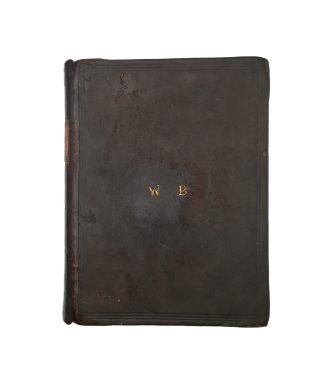GOUGE, William.
CONDUCT FOR WOMEN
Of domesticall duties eight treatises.
London, printed by Iohn Haviland for William Bladen, 1622£4,950.00
FIRST EDITION. 4to. [xxiv], 191, 196-693, [iii]: [par.]⁴, A-M⁸, N⁸(-N8) O⁸(-O1,2+’O’1) P-2X⁸ 2Y⁴, last blank, the variant “N8-O2 are cancelled by one leaf signed O on recto and O2 on verso.” Estc. Quire C misbound with C3 & 4 and C5 & 6 inverted. Roman letter, some Italic. Text within box rule, small typographical ornament on title, woodcut initials head and tail-pieces, early autograph of Edward Kynaston on title and on rear fly. Light age yellowing, tiny closed tear in upper blank margin of title. A very good copy, crisp and clean in contemporary reverse calf, covers bordered with a triple blind rule, ‘W B’ gilt stamped at centres, rebacked, a.e.r.
Rare first edition of this popular and influential conduct book. “William Gouge’s ‘Of Domesticall Duties’ is one of the most sophisticated post-Reformation conduct books written in English and the first substantial Puritan analysis of household duties. The book is a weighty tome both in topic and physical size. The first edition of 1622 ran to 693 pages and this was supplemented by 23 pages of family prayers by the third edition of 1634. This is a large book to digest, to be sure. Yet William Gouge (1575–1653), a famous Puritan preacher in London, intended his work not as a philosophical text on which high-minded readers would ruminate at their leisure. Rather, Gouge designed the book as a daily guide to family life. Books such as this on the family engaged with some of the most pressing public and political matters of the time. The late sixteenth and early seventeenth centuries were characterized by demographic and economic change which had further divided the rich and poor in England. This generated social disorder, or fear of that disorder, and long-held views that the family was central to social and political order meant that attention became focused acutely on the family and the maintenance of its government.” Harvey, Karen. ‘Love and Order: William Gouge, Of Domesticall Duties.’
“The work is divided into eight treatises, starting with the examination of Bible passages that give authority to his ideas of domestic duty, followed by a consideration of marriage and the mutual duties between husband and wife, and six further treatises on the specific duties of wives, husbands, children, parents, servants and masters.Gouge’s work embraces patriarchy, placing the husband at the head of the household. He says a wife should show ‘obedience’ to her husband’s authority and ‘come when he calls’ her. She should refrain from ‘ambition’ and abandon any idea that ‘wives are their husbands equals’. This was not an unusual view for the time, although Gouge did note that when he preached on female subservience in church he often observed discontented murmurings from the women in his congregation. At the same time, Gouge emphasises the need for ‘fellowship’ between married men and women. A husband should be ruled by ‘wisdome and love’ and avoid ‘too much strictnesse’. In Shakespeare’s day, it was legal for husbands to beat their wives, but Gouge argues strongly against it, seeing ‘buffets, blowes, strokes & stripes’ as unjustified ‘cruelty’. He asks if it is reasonable that a man’s ‘bed-fellow’, the ‘joynt governour of the family, should be beaten at his hands’ and risk losing the respect of her ‘children or servants’ (p. 391). Instead, he suggests that, if she needs to be disciplined, she could be ‘restrained’ or ‘denied’ the things she most enjoys (p. 392). It is only if a husband is ‘set upon by his wife’, that he might beat her in self-defence (p. 393).” BL
The autograph on the title ‘Edward Kynaston’ is possibly that of the celebrated English actor (c. 1640 – January 1706), one of the last Restoration “boy players”, young male actors who played women’s roles. Samuel Pepys called him “the loveliest lady that ever I saw in my life” after seeing him in a production of John Fletcher’s The Loyal Subject at the Cockpit-in-Court, “only her voice [is] not very good”. He also played the title role in Ben Jonson’s Epicoene. Pepys had dinner with Kynaston after this production on 18 August 1660. Simultaneously, Kynaston played male roles as well. cf. Elizabeth Howe, ‘The First English Actresses: Women and Drama, 1660–1700.’
In stock







